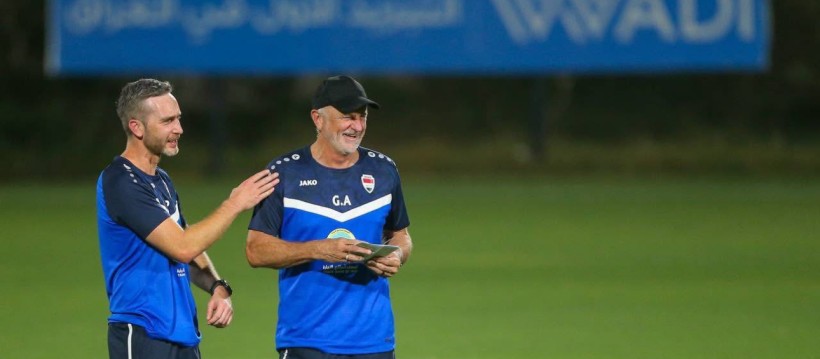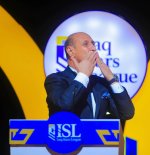
Three Challenges Facing Arnold in the Basra Camp Before the Samson Match
With the decisive dates for the matches against South Korea and Jordan approaching, the Iraqi national football team is experiencing one of the most tense and challenging preparation phases, under the leadership of Australian coach Graham Arnold, who continues to work in the Basra camp amidst increasing pressure to lead the "Lions of Mesopotamia" towards direct qualification for the 2026 World Cup.
Iraq will host South Korea on June 5 at the Basra International Stadium, before visiting Jordan on the 10th of the same month at the Amman International Stadium, as part of the ninth and tenth rounds of the Asian qualifiers. With limited time and immense responsibility, Arnold faces three main challenges that complicate his mission.
The first concern for the Australian coach is the hot weather in the city of Basra, where temperatures reach 46 degrees Celsius during the day and 26 at night. Although training sessions are held in the evening at 7 PM, the atmosphere remains exhausting, affecting the players' fitness levels and tactical responses. Arnold, known for his attention to physical details, believes that the high temperatures may weaken the team's ability to implement his ideas on the field, especially against a fast and organized team like South Korea.
The absence of veteran striker Ayman Hussein from the match against Korea has posed an unexpected blow to Arnold, especially since the player has a physical and moral presence that instills confidence in the rest of the team. The coach now finds himself facing an attacking dilemma, between relying on Mohanad Ali "Mimi", the top scorer in the Iraqi league, or giving a full opportunity to young star Ali Al-Hamadi, a professional with Ipswich Town in England. The choice between the two has not yet been resolved, as Arnold searches for a striker who combines strength, speed, and intelligent movement in spaces, which are precise attributes that are difficult to easily compensate for.
The third challenge relates to the defense line, which has suffered from instability since the days of Spanish coach Jesus Casas. Arnold has tried to address this crisis by expanding his options in the center-back position, calling up players who were absent from the previous list such as Zaid Tahseen, Mustafa Saadoun, Saad Natiq, and Ali Faiz, in an attempt to build a solid partnership that restores balance to the back line. However, the factors of time and lack of harmony remain concerning elements before facing opponents with a high attacking tendency.
The Iraqi national team enters the penultimate round in third place in Group B with 12 points, one point behind second-placed Jordan and four points behind the leading South Korea. Since direct qualification includes the top two teams from each group, the matches against Korea and Jordan represent a "life or death" situation for Iraq's hopes of appearing in the World Cup without resorting to a grueling continental playoff.
The camp in Basra is not just physical preparation, but a space for restoring balance, building confidence, and breaking barriers. As for Arnold, he knows well that success in this challenge will be a historic step that immortalizes his name in Iraqi football.
Iraq will host South Korea on June 5 at the Basra International Stadium, before visiting Jordan on the 10th of the same month at the Amman International Stadium, as part of the ninth and tenth rounds of the Asian qualifiers. With limited time and immense responsibility, Arnold faces three main challenges that complicate his mission.
The first concern for the Australian coach is the hot weather in the city of Basra, where temperatures reach 46 degrees Celsius during the day and 26 at night. Although training sessions are held in the evening at 7 PM, the atmosphere remains exhausting, affecting the players' fitness levels and tactical responses. Arnold, known for his attention to physical details, believes that the high temperatures may weaken the team's ability to implement his ideas on the field, especially against a fast and organized team like South Korea.
The absence of veteran striker Ayman Hussein from the match against Korea has posed an unexpected blow to Arnold, especially since the player has a physical and moral presence that instills confidence in the rest of the team. The coach now finds himself facing an attacking dilemma, between relying on Mohanad Ali "Mimi", the top scorer in the Iraqi league, or giving a full opportunity to young star Ali Al-Hamadi, a professional with Ipswich Town in England. The choice between the two has not yet been resolved, as Arnold searches for a striker who combines strength, speed, and intelligent movement in spaces, which are precise attributes that are difficult to easily compensate for.
The third challenge relates to the defense line, which has suffered from instability since the days of Spanish coach Jesus Casas. Arnold has tried to address this crisis by expanding his options in the center-back position, calling up players who were absent from the previous list such as Zaid Tahseen, Mustafa Saadoun, Saad Natiq, and Ali Faiz, in an attempt to build a solid partnership that restores balance to the back line. However, the factors of time and lack of harmony remain concerning elements before facing opponents with a high attacking tendency.
The Iraqi national team enters the penultimate round in third place in Group B with 12 points, one point behind second-placed Jordan and four points behind the leading South Korea. Since direct qualification includes the top two teams from each group, the matches against Korea and Jordan represent a "life or death" situation for Iraq's hopes of appearing in the World Cup without resorting to a grueling continental playoff.
The camp in Basra is not just physical preparation, but a space for restoring balance, building confidence, and breaking barriers. As for Arnold, he knows well that success in this challenge will be a historic step that immortalizes his name in Iraqi football.










